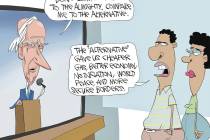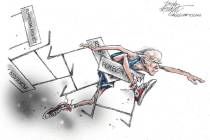Trump ‘racist’ flap could wind up helping him
The press-imposed narrative on the Trump presidential campaign over the past two weeks has featured the Republican candidate committing a racist blunder by suggesting that a federal judge is biased against him because of the judge’s Mexican-American heritage.
And maybe it was a blunder. Mr. Trump certainly won’t be the first, or the last, politician to say something that maybe he shouldn’t have.
But there’s another way to view the whole thing, too, and one you probably haven’t heard: Each time in this presidential campaign that the press or Mr. Trump’s opponents (apologies for the redundancy) have seized on a so-called Trump blunder, the candidate has emerged stronger than before.
Mr. Trump’s remarks about the federal judge, Gonzalo Curiel, who is presiding over a civil case involving people suing Trump University, effectively neutralize the issue going forward. If the case goes in Mr. Trump’s favor, people will be impressed that he won even though he publicly disparaged the judge. If Mr. Trump loses the case, people will dismiss it as the work of a judge who was either biased to begin with or annoyed at being accused of bias.
On the substance of whether a judge’s family background or origin might influence the judge’s point of view, the outrage from the press over Mr. Trump’s comments is hypocritical.
In a speech to the New York Association of Black Journalists in 2014, the executive editor of the New York Times, Dean Baquet, reportedly said, “Having a journalist of color in important positions truly matters.”
He said, “A staff that is not diverse cannot hope to cover the world. A staff that is not diverse will not see why Ferguson is a story that’s so resonant in so many different ways and won’t stick with it to the end. A staff that is not diverse might not cover the television business as clearly as maybe we should. … A staff that is not diverse will not see the story of economic upheaval in as different and clear a way as it should.”
What’s more, the Washington Post reported earlier this year that at the Times, “Supervisors who fail to meet upper management’s requirements in recruiting and hiring minority candidates or who fail to seek out minority candidates for promotions face some stern consequences: They’ll be either encouraged to leave or be fired.”
Are we supposed to believe that journalists of color perceive and write about issues in the news, or even television shows, differently because of their backgrounds, but that judges are totally unaffected by their heritage?
The recent rush to condemn Mr. Trump as racist is so reflexive that it reminds people of one of the candidate’s virtues. He is attractive as an antidote to the stifling political correctness imposed by elites who police the bounds of acceptable thought as ferociously as any Ferguson policeman — sorry, police officer.
Voters are shrewd enough to see through the faux outrage — fauxtrage? — here. Polls taken by Public Policy Polling after the flap over Judge Curiel have Donald Trump tied with Hillary Clinton in Pennsylvania and ahead by one percentage point in Florida. President Obama beat Mitt Romney in both of those states in 2012.
To pull ahead of Mrs. Clinton, Mr. Trump will need to try to turn the discussion back to his more positive vision of restoring American greatness. But it’s impressive that Mr. Trump is still tied or narrowly leading in the polls in those two states after two weeks of being hammered by the press, the Democrats, and even many of his fellow Republicans as a gaffe-prone racist. It’s more evidence of what his victory in the crowded primary field demonstrated convincingly: for a non-politician, Donald Trump is one pretty darned talented politician.
Ira Stoll is editor of FutureOfCapitalism.com and author of “JFK Conservative.” His column appears Sunday.























